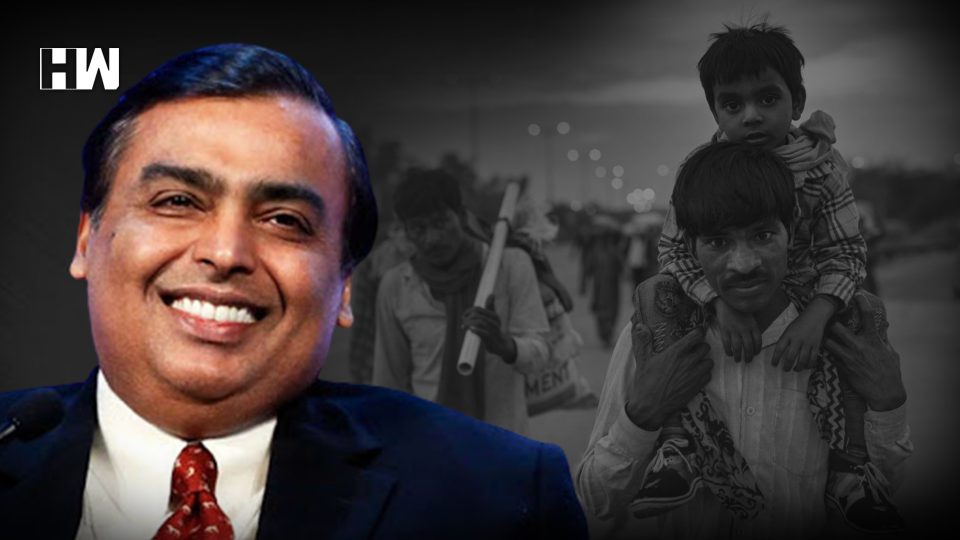“It would take an unskilled worker 10,000 years to make what Ambani made in an hour during the pandemic,” the Oxfam report said.
Non-profit group Oxfam, in a report to be tabled at the World Economic Forum at Switzerland’s Davos, said the coronavirus pandemic has worsened existing income inequalities between India’s super-rich and its crores of unskilled workers, many of whom are often unemployed for long periods and struggle to access basic healthcare and sanitation.
Titled ‘The Inequality Virus’, the report said the wealth of the country’s billionaires increased by an estimated 35 per cent during the lockdown, while 84 per cent of households suffered varying degrees of income loss, and 1.7 lakh people lost their jobs every hour, in April 2020 alone.
Income increases for India’s top 100 billionaires since March 2020, when the lockdown was enforced, was enough to give each of the 138 million poorest people a cheque for ₹ 94,045, the report stated.
“The rising inequality in the country is poignant… it would take an unskilled worker 10,000 years to make what (Reliance Industries’ Chairman Mukesh) Ambani made in an hour during the pandemic… and three years to make what Ambani made in a second,” the report said.
Mr Ambani, in August, was declared the fourth richest man on the planet.
In the months before and after, due to the world’s strictest lockdown enforced in India, lakhs of migrant workers were left without jobs, money, food or shelter.
Heartbreaking visuals of men, women and children walking thousands of kilometres back to their villages made headlines, as did those of the hundreds (potentially thousands) of deaths. The government invited a sharp response from opposition leader Rahul Gandhi after it later told the parliament that it had no data on these deaths.
“The sad part is the government does not care about the loss of lives. The world saw them dying…,” the Congress leader had said in Septemeber.
As the impact of the lockdown became apparent early last year, the Modi government announced an economic relief package worth around ₹ 20 lakh crore. Prime Minister Narendra Modi hailed it as the cornerstone of his “Atma-Nirbhar Bharat (self-reliant India)” vision.
The Oxfam report, however, said the “direct fiscal impact” of the package, which included increasing FDI in the defence sector and opening up space exploration to the private sector, came to “a little more than INR 2 lakh crore, or a mere one per cent of GDP”.
The report also went to add that if India’s top 11 billionaires were “taxed at just one per cent on the increase in wealth during the pandemic” it could increase allocation to the Jan Aushadhi scheme – which makes quality medicines available at affordable prices – by 140 times.
The Oxfam report also highlighted inequalities in access to healthcare, arguing that Covid protocols like social distancing and washing of hands were “a luxury when 32 per cent and 30 per cent of households live in one room and two room houses, respectively, in urban India”.
The global version of Oxfam’s similar report showed distressing gaps in income inequalities – exacerbated by the pandemic – across the world.
“Worldwide, billionaires’ wealth increased by a staggering $3.9 trillion between March 18 and December 31, 2020… at the same time it is estimated that the total number of people living in poverty could have increased by between 200 million and 500 million,” the global report said.
Oxfam, among the suggestions made to the Indian government to address such inequalities, said the Indian government should immediately revise minimum wages and enhance these at regular intervals.
The group also called on Modi government to impose a two per cent surcharge on those earning over ₹ 50 lakh and introduce a temporary tax on companies making windfall profits during the pandemic.
“It is time for the Government of India to take specific and concrete actions to build a better future… citizens’ voices seek a more equal and just future,” the report added.
As an independent media platform, we do not take advertisements from governments and corporate houses. It is you, our readers, who have supported us on our journey to do honest and unbiased journalism. Please contribute, so that we can continue to do the same in future.

